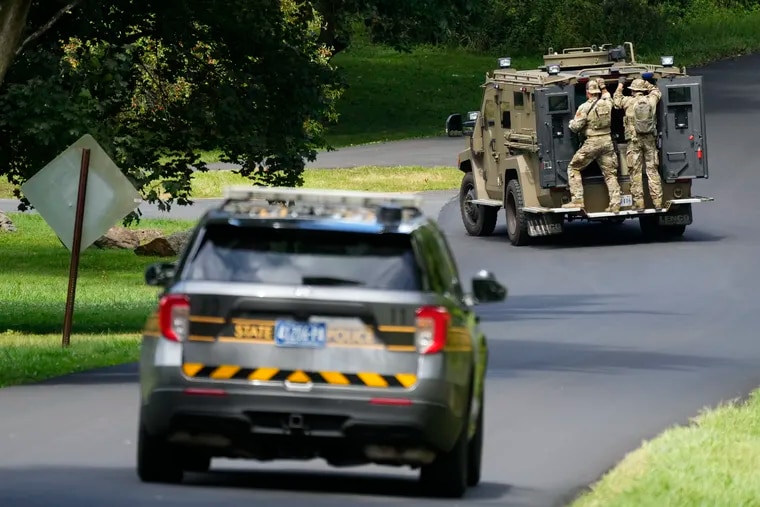
Danelo Cavalcante, 34, stabbed his former girlfriend of two years dozens of times in front of her two young children in 2021. He was convicted of first-degree murder and sentenced to life in prison for the death of Deborah Brandao, 33, only to escape Chester County Prison at the end of August.
As hundreds of law enforcement officers search for Cavalcante, who has been on the lam for close to two weeks, some residents have asked why he remained in the United States to begin with.
Cavalcante is an undocumented immigrant who entered the country illegally. He fled to the United States because he was wanted for a 2017 murder in his native Brazil. Prosecutors contend he killed Brandao after she learned of that murder and threatened to go to authorities.
That’s led some to wonder: Shouldn’t he have been deported before he committed another crime or after he was convicted of killing Brandao? According to area immigration attorneys who work with people facing deportation, the short answer is no, and that’s generally to ensure justice is carried out in the most serious of crimes.
Studies show U.S. citizens are more likely to be arrested for violent, drug-related, and property crimes than their undocumented counterparts. There are about 11 million undocumented people living in the United States, according to U.S. Census data, and immigration attorneys say those who keep a low profile can fly under the radar, as authorities are more concerned with immigrants who pose a threat to public safety.
“The main net that the Department of Homeland Security uses to try to catch those people, to initiate what are called removal proceedings, is a contact with the criminal justice system,” said Ricky A. Palladino of Philly-based Palladino, Isbell & Casazza, LLC.
That’s what appears to have happened with Cavalcante. It wasn’t until he was wanted for a homicide that Chester County authorities learned he was also wanted in connection to a murder abroad. An Immigration and Customs Enforcement spokesperson told the New York Times a detainer was lodged against Cavalcante after his arrest in Chester County.
Still, attorneys say it’s in the justice system’s interest to keep some of the most serious offenders on U.S. soil, as their home country is under no obligation to mete out prison time for crimes committed elsewhere. Palladino said it’s a way to ensure justice for the victims of serious crimes and their families.
“The victim’s family would also have an interest in making sure that he served his full sentence because some people would argue that if he’s sent back, he’s given a new lease on life,” said Palladino.
Lonny Fish, who represents undocumented immigrants charged with crimes at the Liberty Law Team, said keeping serious offenders in U.S. custody is also meant as a deterrent. It tells people they will serve their full sentence if they commit a crime.
Still, attorneys said immigration authorities do not hesitate to deport people who have been convicted of crimes. So-called deportable offenses run the gamut. They include crimes involving moral turpitude, controlled substances, and firearms offenses. There are also pettier crimes involving theft. Attorneys say the immigration system typically offers little leniency for the pettier crimes.
Thomas Griffin, partner at Philly-based Solow, Hartnett and Galvan, said someone’s documentation, or lack thereof as in Cavalcante’s case, will often come to the attention of immigration authorities as they await criminal proceedings. During this time, Griffin said ICE can issue a detainer, which basically lets local authorities know they want to come back for the person in custody the minute they’re up for release.
“So when he walks out of the prison that day, having completed a sentence he goes right into a whole other justice system,” said Griffin.
Even so, Griffin said undocumented immigrants convicted of crimes can avoid deportation if they can make a case for asylum, hardship, or have American-born children who need them. They also have a better chance of avoiding deportation if they’ve been in the country for an extended period of time without legal trouble.
Back in Chester County, Pennsylvania State Police Lt. Col. George Bivens described few endings for the fugitive. Bivens said law enforcement has been authorized to use deadly force against Cavalcante if he isn’t actively surrendering.
Cavalcante’s other choice is to go to prison for the rest of his life, said Bivens. That would be in the United States.
This post was originally published on this site be sure to check out more of their content.






